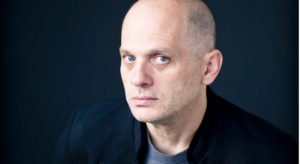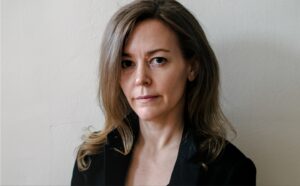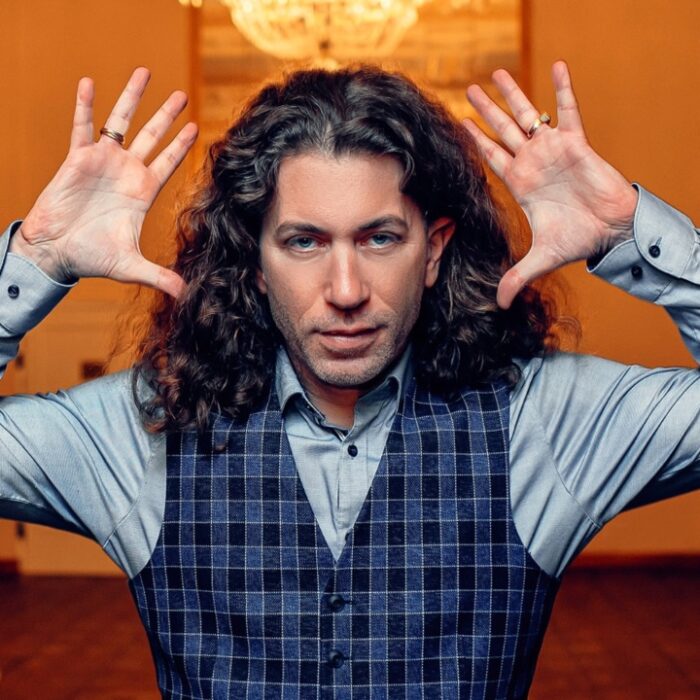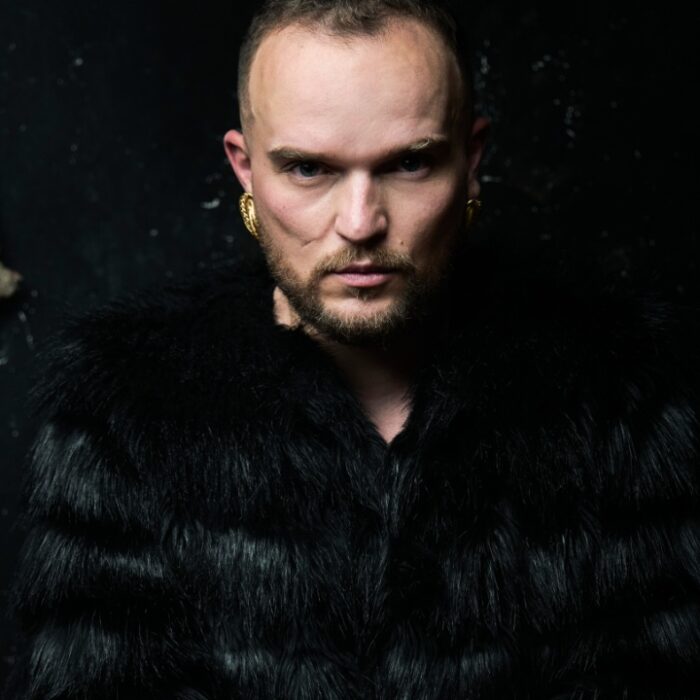
Q & A: Composer David Lang on Creating ‘note to a friend’ for Japan Society
By Jennifer PyronJapan Society will premiere Pulitzer Prize-winning composer David Lang’s newly commissioned opera, “note to a friend,” as part of the 10th Anniversary of the Prototype Festival in January 2023. This new work reimagines three texts written by Ryunosuke Akutagawa and navigates the nuanced complexities of a human being’s perspective on his own life and afterlife.
OperaWire visited more with Lang about his work and the power of his inner-curiosity that continues to drive him forward.
OperaWire: I am fascinated by your work and want to get to know you better. Tell me about “note to a friend” from your perspective and how you navigate your process when further developing your creative ideas.
David Lang: This piece is a commissioned work for the Japan Society and based on a topic that is related to Japan. However, I am not Japanese. I can barely profess to understand my own culture and so, the idea that I might do something that supposes I might know something about someone else’s culture, is troublesome to me. Therefore, what I proposed to them in return was that I find something that was interesting to me, that comes from a Japanese source, and that I could rewrite from my perspective. I am not trying to do something that is accurate.
“Note to a friend” is based on this writer named Ryunosuke Akutagawa. But, this is not a bio-opera or about any facts based on his life. There are details, in my libretto, where I have completely changed what he has said. Like an absolute 180 degree change that became the opposite of his original text. Because, once I started writing, it wasn’t about him anymore. It became about me and what I think.
I remember, when I was a kid in high-school, I took a film studies class where we watched the film ‘Rashomon.’ This legendary film is about the inability of people to understand one another and how this is based on their individual experiences. I found this story interesting and learned how Akira Kurosawa drew his inspiration from Akutagawa. I started reading Akutagawa’s writings, after watching this film, and one of his writings that stuck with me the most was his suicide note. While Akutagawa was thinking about killing himself, he wrote to his friend and laid out his case for how and why he planned on killing himself.
Akutagawa’s note was very smart and, at times, even humorous. The details of his thought process became this self-realization about how some ways of dying would not work because people knew him too well. For example, he could not drown because people knew he was a great swimmer. This document jumped out at me and I became even more curious about Akutagawa in this way. I proposed, to Japan Society, my idea to begin from this suicide note and pull other stories about Akutagawa to then create a story about the perspective of a new character I wanted to call, The Dead Man.
The Dead Man, who killed himself, comes back to tell us his story. He tells us where he is after-death and what he was thinking about just before his death. We learn why he did what he did and how he did it. He doesn’t say whether this is a good or bad thing. He is self-processing where he is. I thought of Akutagawa’s suicide note as an invitation for me to invent this other character and this other dramatic situation. This is what allowed me to write the libretto which, as I said earlier, is far off from Akutagawa’s original text.
These are the details on how I further developed my ideas for ‘note to a friend,’ but you said you wanted to get to know me better in this article for OperaWire. I have written a lot of operas. They are all something I would consider to be unusual. They all ask the question, “What is essential for a piece to be an opera?” And, “Can this essential thing be in another setting that is not an opera house?” This has been a life-long interest of mine. I wrote the ‘Mile-Long Opera,’ which was performed on the High-Line by 1,000 singers and their arias. Instead of the audience sitting in a seat and watching the performers move across a stage, the singers are stagnant and the audience moves along the High-Line to experience each singer’s aria. I also wrote ‘the whisper opera,’ which is an opera so quiet it’s whispered. No one hears the same story because as the singers walk by, you hear only a snippet of their libretto whispered in front of you. There is also the opera I wrote for the New York Philharmonic, ‘prisoner of the state.’ It is a rewrite of the opera ‘Fidelio’ that has all of the necessary opera forces and is fully staged, but instead of the performance being in an opera house, it takes place in a concert hall. What I try to do is take the thing I love about opera, which is the character who needs music in order to allow for us to go deep and to find out who that character is and what that character is going through. Music is necessary for that. This is what opera music does and what I love most about opera.
OperaWire: I recently read the interview you did with Nico Muhly in 2012, for BOMB Magazine. I love how you both talked about your list of works. I imagined you going through this massive catalog and counting each one. You were having this eye opening experience where you then started to wonder how you would continue to fuel this level of production. And I wanted to ask you, as I was imagining this at that moment, how you plan to continue in this way.
For me, I experience your work at a very deep level and so I can only imagine that your process requires more of you than most are willing to dedicate themselves, as a composer. What drives you forward in this way?
DL: I always tell my students that the greatest gift of being a composer is that you get to spend a lot of time by yourself. You spend most of your time in a studio. Alone. Staring at your piece of paper, or your computer screen and contemplating what is worth doing. Behind the question, What is worth doing?, are the questions: Who are you? What do you care about? What moves you emotionally? What are you interested in?
This alone time is a great opportunity to pay attention to yourself. For someone who is introspective, and terrified about the future. For someone who is concerned on a microscopic level about how their relationships are going with everyone around them. As a composer, the end point to these investigations is music. The idea of being productive and able to write a lot of music comes from me critically thinking about who I am. And I haven’t stopped yet.
OperaWire: When do you feel this level of self-examination began for you? Was there a moment in your childhood that inspired you in a way that catalyzed this pulling of the thread to investigate further?
DL: I started writing music when I was nine. I saw a Leonard Bernstein concert film and had never heard of classical music or even had a musical instrument in my home. But, this film lit a fire for me. I began to think music was something cool, but not something that I would do for a living or a career, or for life. By the time I got to high school, I played in every ensemble, including the marching band, jazz band, and the orchestra’s wind ensemble. I got to school early everyday to play the bugle for the flag raising ceremony. I became a total music nerd. But, I didn’t go to college to study music. I chose to study chemistry so I could become a doctor. I think what was interesting about that for me was I never really felt like a musical insider. I felt like music was something other people did and that I was just killing time while I was taking my medical exams. I think what this did for me was provide me with this sort of inside-outside perspective based questioning. I looked at what it meant to be a professional musician through a critical lens and when I got out of college I just thought I was not really cut out to be a doctor. It was an interesting and intellectual enterprise, but once it had to become practical, I didn’t think it was going to be a good fit for me.
OperaWire: Tell me about your collaborations throughout your career. I am astounded by how many amazing people you have worked with in your lifetime. Who has walked the walk of pushing the most boundaries with you?
DL: One of my most important collaborations is Bang on a Can. I get to create with my two best friends, Michael Gordon and Julia Wolfe. Bang on a Can is a good basis for a friendship because it is a shared Utopian vision of all the things that could be different in the world and we get to decide together how we are going to help make these things change. The way this collaboration works is we charge each other up and we inspire one another. These are my friends and I would be embarrassed to let them down or pass off my work to them. This is about a mutual interdependence that makes a collaboration possible.
Collaborations in opera are a little different because there are a lot of things that have to happen and I only know how to do some of them. When you do something larger than yourself, you have to depend on other people and this form of collaboration is an admission that there are some things you may need but cannot do yourself. This is very humbling. When you enter a collaboration with a sense of humility, it becomes a lot easier to figure out how to deal with people and how to get the best out of someone. But, what this also means for me is that there are some things I know how to do and some things I sort of know how to do. Because there are so many different jobs in an opera, I get to decide what responsibilities I’m able to do. This satisfies different parts of myself in different projects. My opera ‘the loser,’ for example, is a libretto I adapted myself. I decided I wanted to be stage director, and I’m not a stage director, but I had an idea that I felt was strong enough for this piece. For ‘note to a friend,’ I wrote the libretto and the music, but one of the greatest joys of this project, for me, is the opportunity to work with Yoshi Oida. He is legendary. I feel I’ve been able to take full advantage of working with this incredible legend. I choose to not have any theatrical instructions that would tell him how to shape this piece. I wanted it to be a blank slate for him. For example, ‘prisoner of the state,’ which I also wrote the libretto for, has instructions on who enters the stage when who does what. I was very specific about what the theatrical experience should be in this work. But, ‘note to a friend’ is the opposite. I trust Yoshi Oida and I’m also really curious about what he can do with the project. I want to give him the widest opportunity to do whatever he wants to do.
OperaWire: When I listen and experience your work, there is a consciousness that you create in the form of space. I feel that this listening space allows me to become part of an atmosphere that sometimes is not present in music. The composer might not have taken time to create this space or even the time to process the value of space. Do you feel that the more you write and produce, the easier it becomes to create purposeful space? I truly appreciate the conscious spaces you create.
DL: Thank you. I hope that’s because I’m trying to do this for myself. I think what happens sometimes as a composer is that you’re trying to get to yourself. You want to create the kind of experience that you want to have. The sense of time and invitation for yourself to get the most out of it. If you can do that for yourself, then there is a chance that you can do that for others. I appreciate that.
I also think that the technical secret to this is that there is a lot of empty space in my pieces. A lot of silence and rest. I think this gives people the chance to measurably feel something instead of hitting them over the head every second. I enjoy giving people room to figure out how to get into the piece themselves. I think emotions are interesting too. What happens in opera a lot of times is that it tells you exactly how to feel and exactly when to feel it. The operatic experience of everyone in the audience gasping or laughing at the same time. This becomes a community of people who are supposed to have the same response. But, most of life is not like this.
In life, people have their own responses. People may have the same emotions but at different times. I feel like sometimes as a composer it might feel like it’s a job to make sure there is an emotional response. However, I feel that composing is an opportunity for me to create an atmosphere that allows the listener to have their own emotional response. Your response is up to you. For me, this is the kind of experience that I appreciate. One that says there is room for me to decide how deep I want to go into it. If there is room for me to decide how deep I want to go, I’m likely to go deeper than I would have gone if someone had told me, “ok, now cry.”
OperaWire: Do you feel that we are watching opera become more of a safe space for a wider range of audience members to enjoy? What I mean by a safe space is that it is becoming more inclusive.
DL: I’m not sure that opera is changing in this way. Except, I do think there is a wider range of people that are trying to use opera in their work. What this means is that now there is a wider range of options. There is a better understanding about what opera is capable of and one hopes there will be a much wider range of people who can participate in this way. What this might mean then, in correspondence to your idea of a safe space, is that new audiences will come in that will be open to other kinds of experiences. I think this is what we all hope.
And this topic can launch us into a whole other hour of conversation. For the future, let’s go there.



